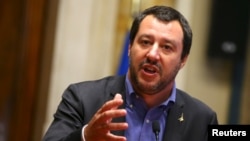Italy's far-right anti-immigrant interior minister, Matteo Salvini, has announced plans to count the ethnic Roma community living in the country and deport those without Italian nationality.
Salvini, who also serves as deputy prime minister and leads the Northern League party, said he has ordered a new census aimed at expelling non-Italian Roma. But reaction to his idea came from all sides.
Salvini has been very clear about not wanting anyone who is illegal on Italian soil. He set off a storm of controversy in Europe last week when he refused to let a charity ship carrying more than 600 mainly African migrants dock in Italy.
He said his ministry is looking at what he called "the Roma question" and wanted to see "who, and how many" there were. He was particularly clear that he did not want what he described as "these criminals" to be kept in Italian prisons and was looking at ways to deport them.
He said an agreement is needed with the countries that must take them back, like Romania, Albania and Tunisia. He claimed that they are the countries of origin from which criminals in Italian prisons are most numerous and added that Italy would "unfortunately" have to keep Roma found to have Italian nationality.
The policy was met with resistance by Prime Minister Giuseppe Conte, who was quoted in Italian press reports as saying Salvini had gone "too far." The leader of the anti-establishment M5S, Luigi Di Maio, called Salvini's order "unconstitutional."
Anna Maria Bernini, of the center-right Forza Italia party, said the government should guarantee the respect of the law without discrimination.
The leader of the right-wing Brothers of Italy party, Giorgia Meloni, said a census of the Roma was "OK" — obviously a first step. But the problem is much wider, she added, and requires strong decisions.
The center-left Democratic Party (PD) was highly critical of Salvini, saying his call revived memories of "ethnic cleansing."
Acting party secretary Maurizio Martina said nationalist and sovereignty positions like these are the worst and provide no real solutions to an enormous historical issue.
Salvini subsequently explained that the government had no intention of setting up a separate archive for Roma. He said he wanted to protect Roma children whose parents bar them from going to local schools and instead instigate them to criminality.
Tens of thousands of Roma live across Italy, many in squalid shantytowns on the outskirts of major cities. According to an Italian national statistics report in 2017, there were believed to be up to 180,000 Roma in the country, with 40 percent under age 14. About half were believed to be Italian citizens.




